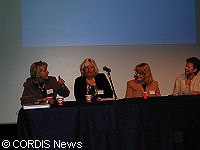Swedish researchers call for more research on gender issues
Participants at a conference organised by the Swedish Research Council on gender specific health issues have called for a better gender balance in medicine, and for more research to be carried out on gender related healthcare. 'Men and women have different and specific needs,' said Professor Vera Regitz-Zagrosek from the Centre for Gender Research in Medicine in Berlin. 'They therefore have to be treated differently for optimal care.' Dr Octavio Quintana Trias, the Director for Health within the Directorate General for Research of the European Commission, agreed, stating that women are often excluded as research subjects and that it is important to propose new initiatives to change this, especially as 'the burden of disease is higher in women than in men. Women live longer but their quality of life is not as good as men's.' To the question of why gender differences are important in research, Dr Quintana Trias explained that 'we need to understand that some conditions are unique to the sexes.' This point was also emphasised by Dr Pia Maria Jonsson from the Medical Management Centre at the Karolinska Institute in Sweden, who emphasised the importance of taking into account not only the gender specific diseases (breast cancer for women, prostate cancer for men), but also the gender specific expressions of some diseases, such as diabetes or coronary heart diseases. Dr Quintana Trias explained that the European Commission is very much aware of this, and has therefore produced an action plan on women in science, which includes the aim of increasing the participation of women by 40 per cent. If the EU can achieve a better gender balance in medicine, this will have an impact on research itself he said. Following on from this point, Dr Karin Schenk-Gustafsson from the Centre of Gender Related Medicine at the Karolinska Institute stated that the existing knowledge of the impact of gender and sex on health issues is insufficient. 'This impairs medical care and research,' she said. Speaking on the subject of 'gender, health and diseases - does sex matter? Special reference to cardiovascular diseases', Dr Schenk-Gustafsson explained that every year, two million women die of cardiovascular diseases in the EU. This means that cardiovascular diseases are the cause of death for 43 per cent of women. This figure is even higher in Eastern Europe. Despite this, between 80 and 100 percent of all cardio drugs given to women have not been tested on them. This must be changed, she warned. Gender specific issues must be taken into account. She explained that the heart and the coronaries are smaller in women who also suffer from a higher pulse. Specifically, female risk factors should also be taken into account, such as premature menopause or diabetes during pregnancy. Furthermore, not only are the symptoms different, but women also tend to have more complications after a heart attack and there is a higher mortality rate in women after a bypass operation, explained Dr Schenk-Gustafsson. All those factors explain by men and women should be treated differently, which has not been the case thus far. 'Thus,' she said, 'sex does matter. It matters in ways we did not expect. Undoubtedly it also matters in ways we have not begun to imagine.' Dr Pia Maria Jonsson, speaking on 'monitoring the performance of the healthcare system from a gender perspective', said that research has shown that the safety, efficiency, and cost-effectiveness of healthcare varies between men and women. Indeed, across Europe, white middle-aged men are more likely to have easy access to new and costly healthcare technology. The hypothesis is therefore that women and the elderly get poorer access to these technologies. 'With women nowadays reaching such a grand old age, this does not make sense,' she said. During the panel discussion, the speakers mentioned the difficulty of getting funding for this type of research. However, they welcomed the inclusion of a symposium on gender and health at the forthcoming Euroscience open forum in August. This will be an opportunity to build up contacts and develop existing informal networks, they said. They also hoped this event would be the opportunity to expand those networks to other fields. A Commission official welcomed the momentum that Sweden is giving this type of research, saying: 'Northern countries must show the way for other European countries. They are the best model of equity in Europe.' She encouraged the speakers to use the framework programmes, as well as ERA-NET. A second Commission official informed the audience that a survey on the gender action plan has produced very positive results, which will be published soon. A call for proposal will also be launched in May, with the aim of developing tools for mainstreaming gender equality.
Kraje
Sweden



